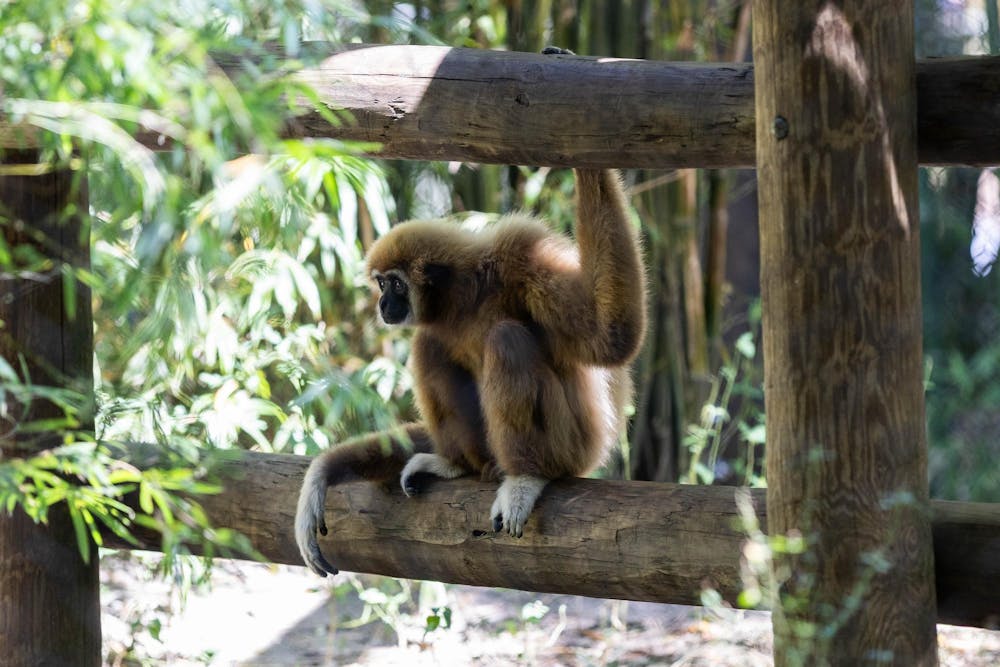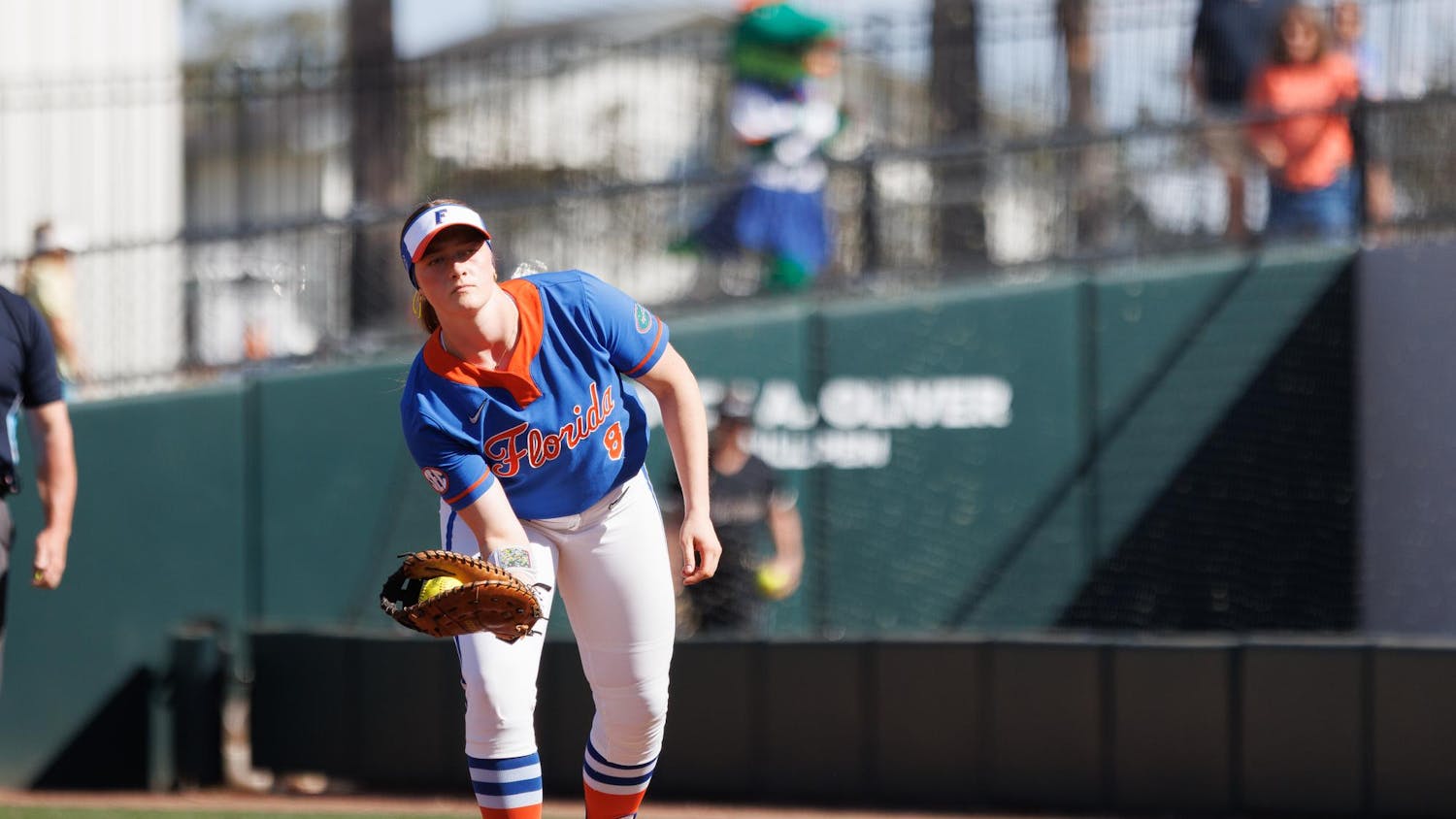At 7 years old, Holmes — one of Santa Fe College Teaching Zoo’s white-handed gibbons — is swinging into a new chapter of his life.
The long-limbed ape left the teaching zoo Sept. 12 for a zoo accredited by the Association of Zoos and Aquariums. AZA-accreditation is a coveted status currently limited to about 250 zoos and aquariums around the world. That means Holmes will receive the highest standard of animal care as he meets an assigned mate to start a family of his own. Holmes’ new zoo has not been made public yet.
Holmes lived at the teaching zoo his entire life, according to Jade Woodling, the conservation and education curator at the zoo. As male gibbons grow older, she said, they become territorial and seek a mate to maintain their status at the top of the family hierarchy.
Holmes has reached the age where he is ready to become the head of his own family, which is why he is departing from the teaching zoo, she said.
Of all the gibbons at the Santa Fe zoo, Woodling said, Holmes was the kookiest. He’s small for an ape — fully grown males in his species typically stand between 1.5 to 2 feet — with long limbs and a hairless face. He has dark fur except around his face, hands and feet, where his fur is white.
“He doesn’t do anything average,” she said. “If he’s going to swing across something, he’s going to flip while he does it.”
White-handed gibbons are an endangered species from Indonesia and the Malay Peninsula. While often mistaken for monkeys at first glance, gibbons do not have tails, so they fall under the ape family.
“With species like this, we want to create what’s called an ‘assurance population,’” Woodling said. “We would have this really healthy, genetic population to draw from.”
An assurance population guarantees a number of healthy gibbons are preserved in zoos in case the wild gibbon population continues to decline. Moving male gibbons to different zoos minimizes inbreeding by assigning mates to the gibbons that are not within their immediate family, Woodling said.
In many other ape species, males assert dominance by having multiple female partners. But male gibbons mate for life and establish a tight-knit family dynamic, Woodling said, where offspring learn how to groom and swing alongside each other.
Between playing and learning, Holmes and his siblings learned to take care of one another, Woodling said.
“It’s always fun to see all the siblings interacting with each other,” Woodling said. “You see a lot of play amongst the siblings. They try to get their parents in on it every once in a while.”
Preparing for the move
Holmes’ family extended past his parents and siblings — he also had a team of trainers that worked alongside him and watched him grow up.
Ryan Smith, a 22-year-old UF hospitality and tourism senior, was Holmes’ trainer in 2023. She got randomly assigned to specialize in gibbons at the zoo when she started there, and she said she wouldn’t have it any other way.
“We always would joke around that he was like the teenage frat guy that didn’t listen to the rules,” Smith said. “But he was honestly such a sweet boy.”
Holmes was the troublemaker son, Smith said, and he enjoyed being an instigator and swinging around the ropes of his habitat with his brother. Though sad to see Holmes go, Smith said she’s excited to see what lies ahead for the gibbon.
Gibbons are a protected contact species, Smith said, meaning for the safety of everyone involved, trainers and gibbons are never in the same room together due to the gibbons' high levels of strength and intelligence.
During training sessions, trainers wait for gibbons to approach them before beginning the process through a mesh barrier. Gibbons can then “break the barrier,” Smith said, allowing trainers to make limited physical contact, often with the gibbons’ fingers or palms.
Training strengthens the connection between gibbons and trainers, which makes caring for the gibbons’ health and potential injuries easier, Smith said. For some exercises, trainers may call the gibbons to come over, ask to touch them or ask to see their palms, arms or other areas.
During some of these sessions, Smith helped Holmes get comfortable with his squeeze cage, which is a small crate used to make transportation, health checkups or vaccinations easier.
Squeeze cage training is a slow process, Smith said, as Holmes had to become comfortable with small spaces before she could move onto closing the pulley-operated door. The intelligent ape noticed as soon as Smith reached for the handle to close the door, and would sometimes immediately run away, she said.
“I was a trainer that he could trust,” Smith said. “I think that his resilience with it helped move the process so much faster.”
The big farewell
Holmes’ transportation from the teaching zoo went smoothly, said Julia Sweet, a 24-year-old student in the Santa Fe Zoo Animal Technology program.
Sweet trains Holmes’ mom, Cajun, and she often observed Holmes’ relationship with his family during training sessions.
Toward the end of Holmes’ time at the teaching zoo, she said he began to “butt heads” with his father, Eddie. Conversely, Holmes has a good relationship with Cajun and knows his mom’s limits, Sweet said.
Cusa and Onyx, his younger siblings, have already begun to act differently in their older brother’s absence.
The two play-fight often and have been doing so more since Holmes’ departure, Sweet said. Onyx, being the youngest, tends to “bounce all over the place,” while Cusa is a bit more mellow.
“Even though it’s super sad, and we already miss him a lot, it’s definitely what is best for him and also what’s best for the family,” Sweet said.
Contact Leona Masangkay at lmasangkay@alligator.org. Follow them on X @leo_amasangkay.

Leona is a second-year journalism student and the Spring 2025 University Administration reporter. They previously worked as the Santa Fe reporter. In their free time, Leona enjoys going to the gym, watching Marvel movies and traveling the country for music festivals.






